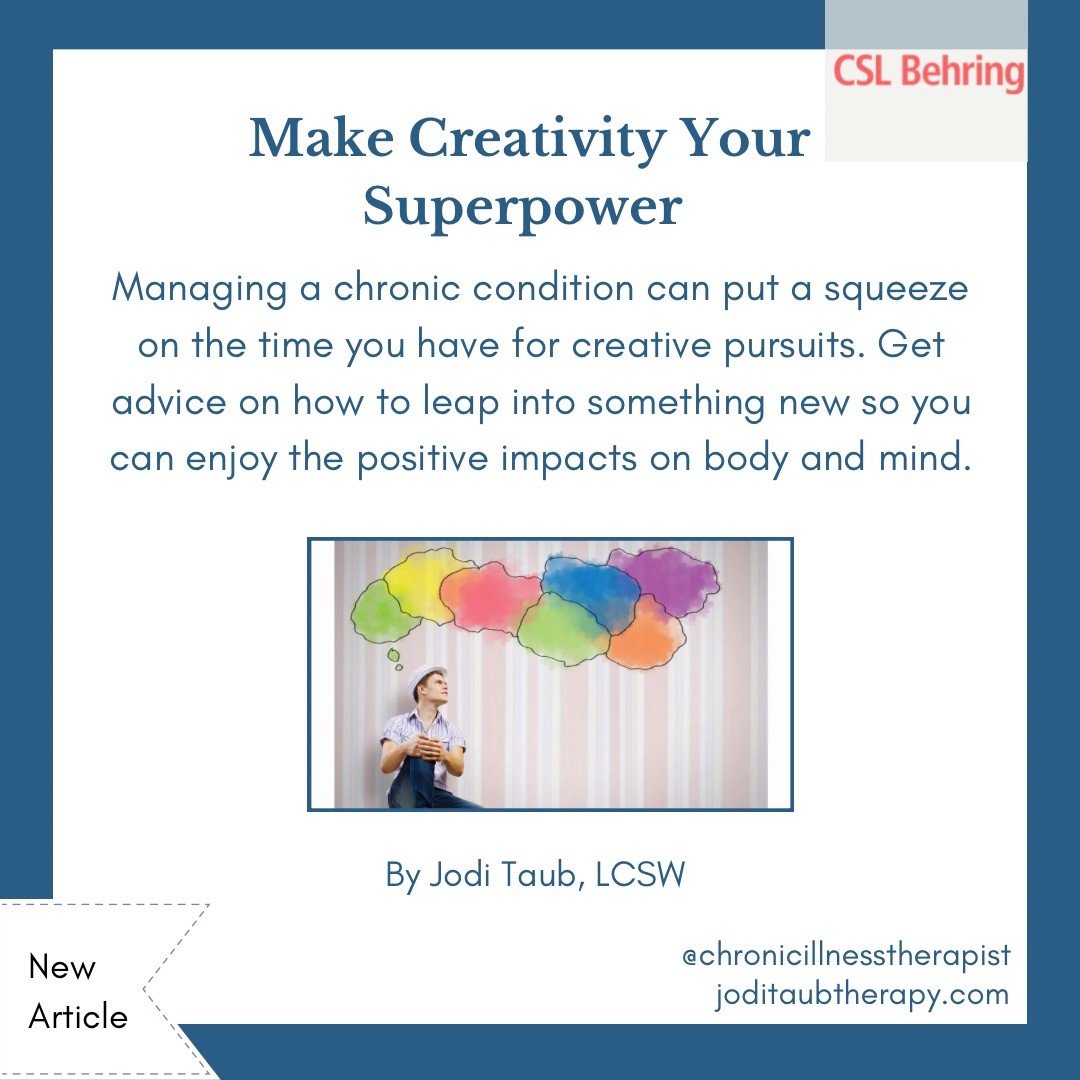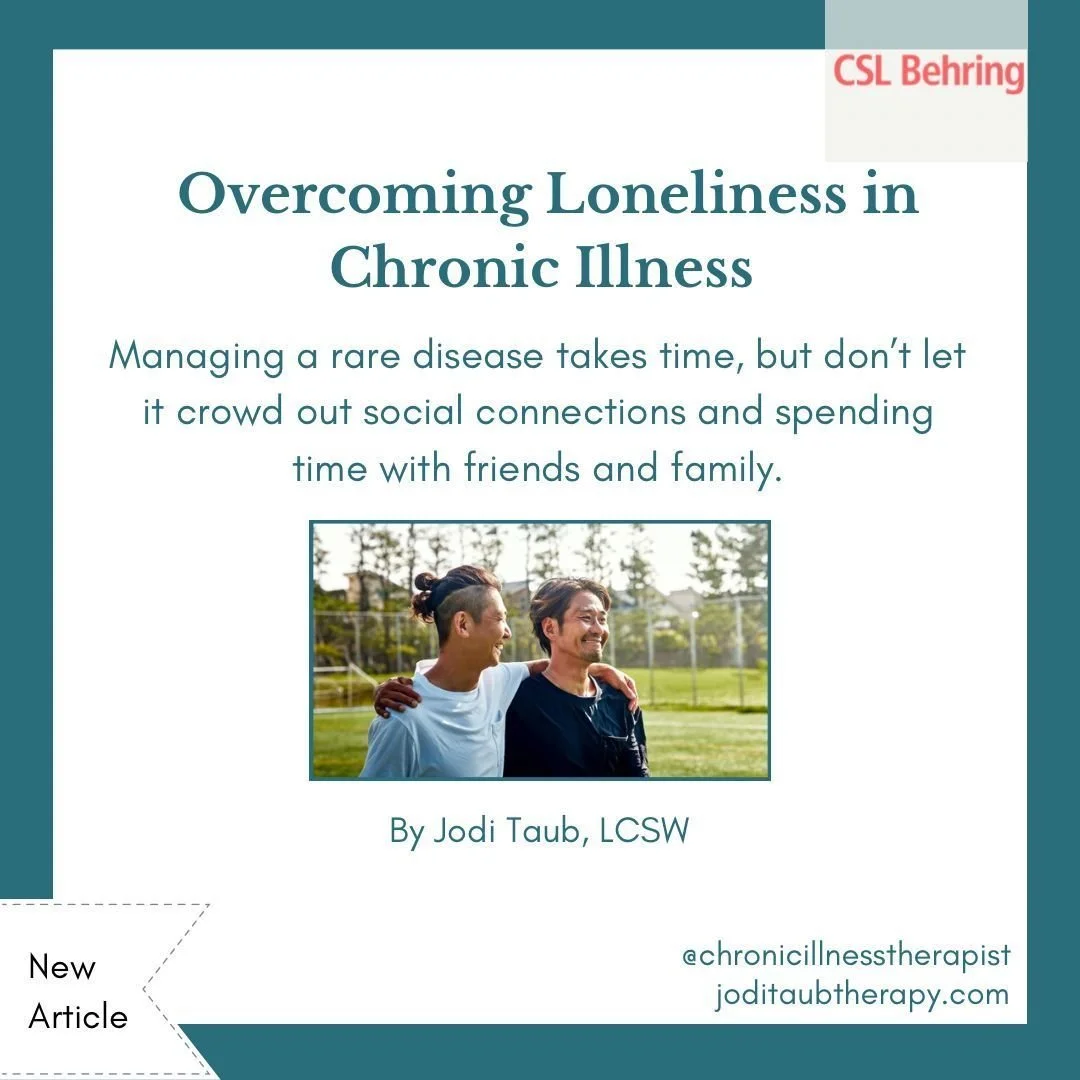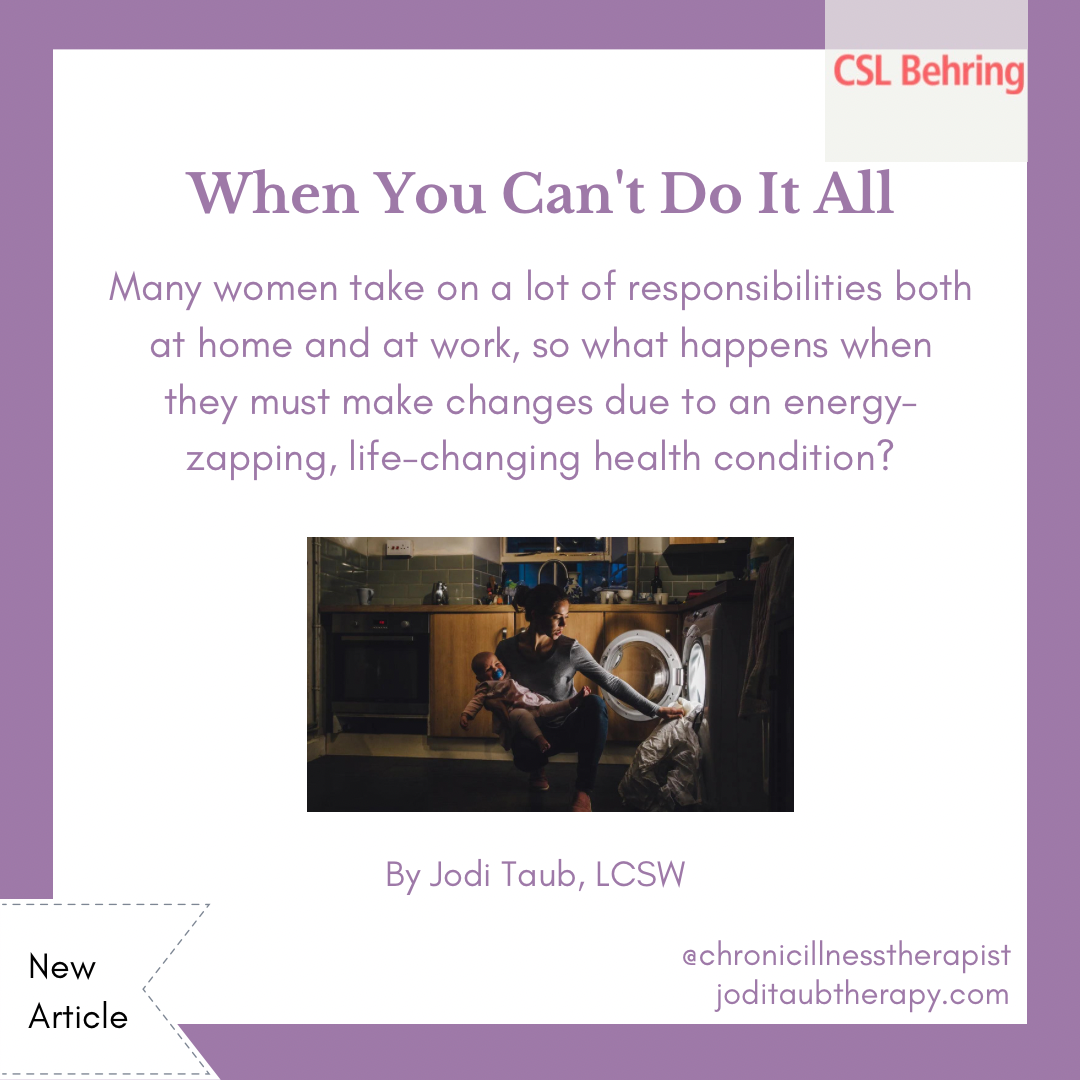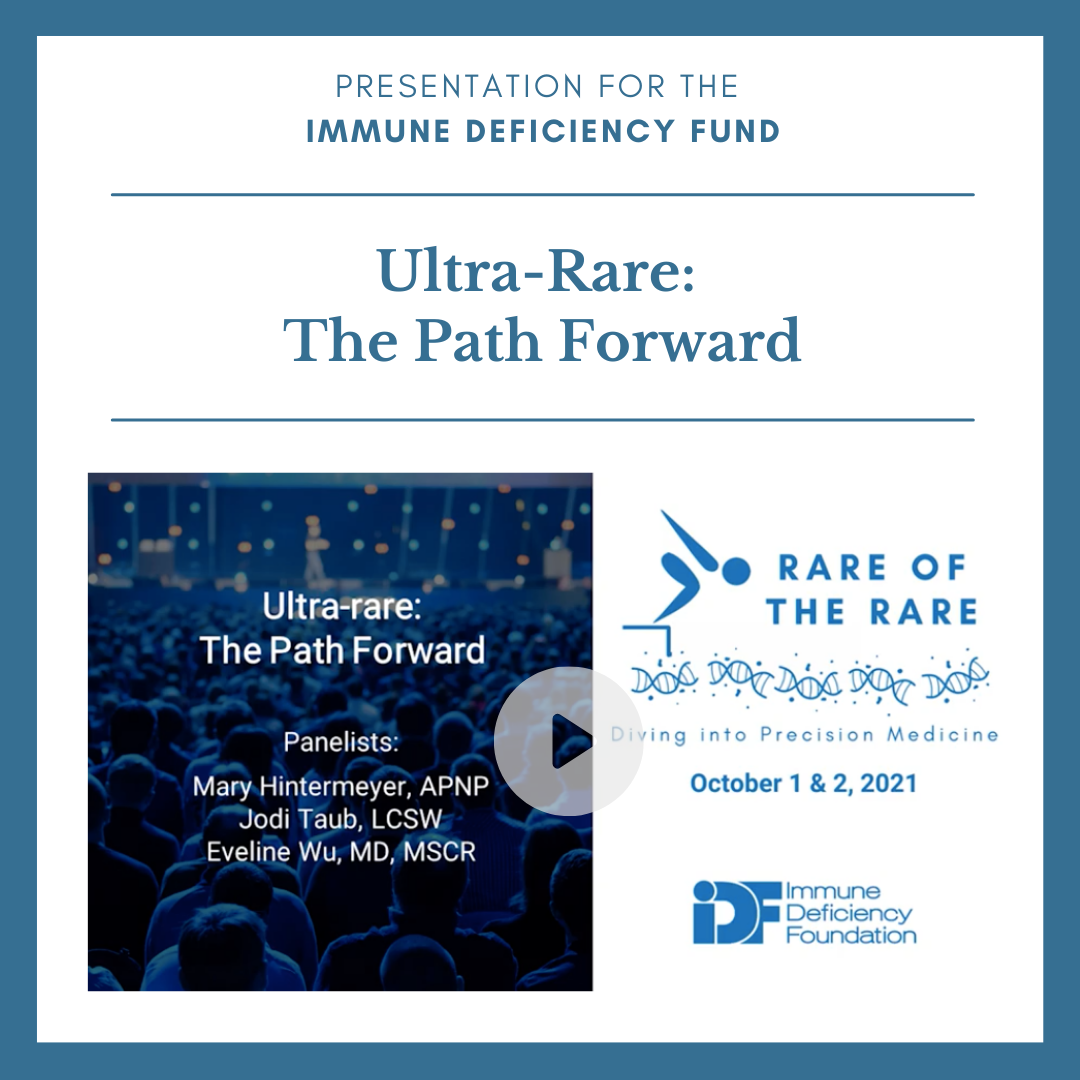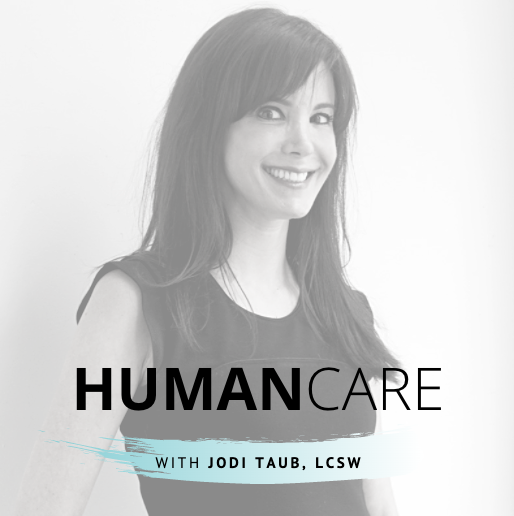In the Media
To work with Jodi for a speaking engagement or media piece, please click here to submit an inquiry form.
Articles
What People Ask Me About Primary Immunodeficiency (PI)
By the Jefferey Modell Foundation featuring Jodi Taub, LCSW, PLLC
Key Highlights:
Invisible Illness Challenges
Simplifying PI Explanations
Distinguishing PI from Autoimmune Diseases
The Burden of Management
Educating Others Recognize
The Emotional Impact
7 Ways to Strengthen Friendships While Living with Chronic Illness and Rare Disease
By CSL Behring featuring Jodi Taub, LCSW, PLLC
Click here to watch the video featuring Jodi.
Key Highlights:
Tell your friends how you value them and look for ways to gain more social time
Explain or re-explain your limitations and ask friends to meet you on your terms
Keep health updates simple and educate them about fluctuating abilities
Let others know how you want to be supported
Maintain more than one friendship
Recognize when you need support from a mental health professional
Reciprocate support for your friends in ways in which you can
A Guide for Immunocompromised Individuals in a Post-Pandemic World
By Tracy Asamoah, MD. featuring Jodi Taub, LCSW, PLLC
"The responsibility of navigating a post-pandemic world falls disproportionately on those most at risk."
Key Highlights:
Ongoing Risks: Immunocompromised individuals remain vulnerable even as society moves beyond strict COVID-19 precautions.
Protective Measures: Masking, improving ventilation, and staying up to date on vaccinations help reduce risk.
Advocating for Safety: Communication strategies for requesting accommodations in workplaces and public spaces.
Emotional Well-Being: Acknowledging the mental toll of long-term precautions and finding support.
Community and Connection: Balancing safety with maintaining a fulfilling social life.
Addressing caregivers’ mental health is key after SCID diagnosis
The article "Addressing Caregivers’ Mental Health Key After SCID Diagnosis" highlights the critical, yet often overlooked, mental health challenges faced by caregivers following a severe combined immunodeficiency (SCID) diagnosis. It emphasizes that the emotional burden—from shock and grief to anxiety and burnout—can profoundly affect caregivers. The piece argues for the integration of mental health support into the overall care plan, ensuring that families not only address the medical needs of the child but also the well-being of those providing care.
Key Highlights:
Emotional Impact: Recognizes the intense emotional toll a SCID diagnosis can have on caregivers.
Integrated Care: Calls for mental health services to be a core part of the post-diagnosis care plan.
Professional Guidance: Features expert advice on the benefits of counseling and mental health support.
Self-Care & Community: Emphasizes the importance of self-care practices and peer support groups to prevent burnout.
As antisemitism seeps into healthcare, Jewish patients and providers are confronting new challenges. Trust—a cornerstone of patient care—can be compromised when identity becomes a barrier to equitable treatment. For Jewish individuals facing this reality, prioritizing health and recognizing trauma triggers are crucial steps. Speaking up or choosing providers with zero-tolerance policies for discrimination are ways to protect oneself. In these sensitive times, I urge my community to remain informed, assert their rights, and seek environments that foster safety and respect in healthcare settings.
Common variable immunodeficiency (CVID) is a primary immune deficiency – one of more than 450 types. Patients are vulnerable to serious infections and health complications, but treatment can reduce those risks.
Key Highlights:
How common is CVID?
What causes CVID?
What are the symptoms of CVID?
How is CVID diagnosed?
What is the outlook for people with CVID?
5 Ways to Manage Chronic Illness Burnout
Having lived with a primary immunodeficiency and working as a therapist with chronic illness patients, I know firsthand the toll of medical burnout. It’s more than exhaustion—it’s managing daily routines, appointments, and treatments without the usual sense of accomplishment or recognition. Let’s talk about how we can address this together.
Key Highlights:
Prioritize your most pressing health care needs
Prepare for uncomfortable procedures
Create your own reward system
Invite your physician into the conversation
Cultivate your community
How to Deal If You Have a Chronic Illness and Your Friends Just Don’t Get It
By Katie Camero, featuring recommendation by Jodi Taub, LCSW, PLLC.
“Feel what you are feeling and accept it. Then pour into your own cup.”
Key Highlights:
Give yourself permission to feel your feelings.
Know when it’s time to end a friendship.
Invest in the people who have stuck by you.
Keep busy with activities that bring you joy.
Be honest with your health care team.
Keep taking care of yourself.
The Grief and Loss of Living With a Chronic Illness
Getting diagnosed with a serious condition can cause a sense of loss. A psychotherapist – and fellow primary immune deficiency patient – offers her advice for processing these feelings and celebrating resilience.
Key Highlights:
Mourning and Validating Loss of Identity
Forming New Friendships and Support Systems
Finding New Occupational or Educational Paths
Scheduling and Looking Forward to Future Events
How to Make New Friends as an Adult When You Have a Chronic Illness
By Katie Camero, featuring recommendation by Jodi Taub, LCSW, PLLC.
There are others out there who will support you. Here’s how to find them.
Key highlights:
1. Find your people.
2. Explore new hobbies that support your needs.
3. Be honest about your illness when you’re ready.
4. Don’t underestimate the value of acquaintances.
5. Give people second chances.
Prepping for College When You Have a Primary Immunodeficiency
By Christine Bahls, featuring recommendation by Jodi Taub, LCSW, PLLC.
For both parents and students, start the planning now to ensure a smooth and healthy transition to life away from home.
Key highlights:
1. Turn to the Immune Deficiency Foundation for support with the college transition.
2. Do the paperwork before leaving for college
3. Agree to a few musts, like wearing a medical alert bracelet and storing emergency info on the phone.
4. Anticipate emotional questions, like whether to tell roommates and others about the illness.
5. Expect an adjustment period while the student assumes responsibility for matters large and small.
Why Rare Disease Day Matters
This February 29, we bring our collective focus to the cause and demonstrate the power of showing our stripes, says therapist and primary immune deficiency patient Jodi Taub.
Key highlights:
1. RDD encourages collective support
2. RDD can be fun and creative
3. RDD builds community bonds
Accepting Limits, Accepting Help
Sometimes we are capable of completing various tasks, and at other times, we are not. This can lead to unfair judgement and misunderstandings. Please read the article in it's entirety to learn about the 5 strategies to address these fluctuations, and how to ask for help
Key highlights:
1. Assess your capabilities and accept your limitations.
2. Have the conversation.
3. Describe what you need.
4. Remember that giving feels good to the giver.
5. Look for your next opportunity to be the helper.
Patient Advocacy Groups Share 2024 Plans
Answering CSL.com’s survey, the leaders of nonprofit patient organizations said they are looking forward to a productive year representing people who live with rare and serious diseases.
What is motivating and inspiring you as we begin a new year?
Leading patients advocates say their organizations will focus on making health care delivery more available and more fair, supporting their patient communities and pushing for scientific advances.
A Year of Progress for Patients
As 2023 comes to a close, leaders in patient advocacy shared accomplishments and highlights in CSL.com’s annual survey.
At year’s end, CSL surveys leaders in patient advocacy – including a few of their own employees – about key initiatives and accomplishments that happened over the last 12 months. As always, they had much to share about the impact they and their organizations made and how they are improving the lives of patients who live with rare and serious conditions.
Make Creativity Your Superpower
Managing a chronic condition can put a squeeze on the time you have for creative pursuits. Get advice on how to leap into something new so you can enjoy the positive impacts on body and mind.
Creative activities can be therapeutic when living with chronic illness.
I highlight 3 reasons:
1. Reducing stress
2. Improving neuroplasticity and brain health
3. Improving connections and decreasing isolation
Overcoming Loneliness in Chronic Illness
Research has shown that living with a chronic disease, especially rare disease, is one of the highest risk factors for loneliness.
If we can identify why and how we are feeling lonely, we can respond with changes designed to address the specific hurt.
1. Social isolation and lack of connection
2. Too little understanding and validation
3. Missing purpose and meaning
When You Can't Do It All
It's tough to manage societal and personal expectations to, "do it all." This rings especially true for women who live with rare, chronic health care conditions.
Key highlights:
1. Establish boundaries with family members and loved ones.
2. Remind yourself of the ways that do care and nurture your loved ones.
3. You are still contributing, despite health flares.
How Long Should Parents Be Caregivers?
As a young person moves into adulthood, it can be time to thank Mom and Dad, tap into their knowledge as caregivers and start building your own support system.
Transitioning to adulthood can be stressful and exciting all at the same time. Young people take strides toward more independence and rely less on their parents. If that young adult has a rare or chronic illness, it’s a good time to shift the responsibility of managing medical care from parents to the now, fully grown child.
Young adults need to learn how to:
Set up appointments and meet with their physicians on their own.
Depend on friends and significant others when they are ill.
Make wise lifestyle choices, which may impact their health.
There are many tools available to help manage our mental health. We often overlook the power of social connections. Studies have shown that our social connections are the greatest indicator of improved mental and physical health.
Please read my three tips backed by peer reviewed studies about why social connections can improve both your physical and mental health!
I also highlight the importance of seeking professional help to address clinical mental health symptoms. Seeking help reflects on a capacity to better cope with stress.
Masking When Others Are Not
For the immunocompromised, wearing a mask in 2023 can invite judgement and criticism.
I recommend three tips for managing pushback as the COVID-19 restrictions are lifted.
1. Convert an awkward moment into a teachable moment.
2. Advocate for yourself.
3. It's normal to feel uncomfortable.
Remember that wearing a mask is an accommodation that allows immunocompromised, high risk folks, and supportive loved ones to move more safely in public. Feeling understood and supported-will help us to live more freely.
Grownups Need Friends, Too
Friendships are some of the most important relationships in our lives. However, just like any other kind of relationships, they take work to maintain. Please read my tips on how to maintain and form new friendships as an adult.
Consider the following suggestions as gentle guidance. I hope this advice will help you avoid potential pitfalls and steer you toward a healthy, happy partnership.
To learn more, please check out the article.
5 Relationship Tips for Patients
All long-term relationships can face challenges-and even more so if you have chronic health care conditions. But despite it all, many individuals have strong and sustaining relationships. Here are five areas to help decrease the bumps along the way.
1. Take steps to prevent caregiver burnout.
2. Maintain a partnership that's about more than caregiving.
3. Acknowledge your partner's experience of your illness.
4. Find a good communication style to use when your illness flares.
5. Be proactive about canceled plans and other inevitable situations.
Dating Advice for Rare Disease Patients
Looking for a partner? As Valentine’s Day approaches, learn which four qualities are essential in a mate, especially if you live with a rare health condition.
Consider the following suggestions as gentle guidance. I hope this advice will help you avoid potential pitfalls and steer you toward a healthy, happy partnership.
Seek someone who is reliable, nonjudgmental, giving and supportive
Seek a secure partner
Learn how and when to tell your health story
To learn more, please check out my article.
Bright Ideas for Rare Disease Day 2023
For Rare Disease Day 2023 Jodi Taub LCSW, and other leaders in the rare disease advocacy space, provided tangible ways to support loved ones living with rare disease.
Jodi Taub, Licensed Clinical Social Worker and primary immunodeficiency patient said in the article, “Support a loved one through increasing awareness. Participate in a walk, fundraiser or social media campaign.”
Some others asked people to “Be a part of the solution and get involved!” as well as to use February 2023 to recognize, advocate, and show up.
Should You Make a New Year’s Resolution?
It’s that time of year again. We resolve to do more of this or less of that. Or maybe we decide to finish something big that’s always been there, just slightly out of our reach. But should this annual tradition really apply to those of us living with chronic health care conditions? If you’re managing a serious health condition, choose a resolution with care and be gentle with yourself.
Here are some ideas to consider on how to keep the good, and avoid any unnecessary stress when you make your New Year’s resolution.
Make it all about you.
Break it down.
Set relationship goals.
Set goals for your emotional health.
Use a team approach.
Be time-flexible
Make it fun and joyful.
Read more about this topic in my article in the CSL Behring Vita series Should You Make a New Year's Resolution?
Looking Back at 2022
CSL Behring asked leaders in patient advocacy to share examples of creativity and innovation in 2022. 14 leaders, including heads of patient organizations, patients and CSL staff participated and shared their ideas this year. One of those leaders was Jodi Taub, Licensed Clinical Social Worker and Primary Immunodeficiency Patient, who talked about her IDF Virtual Caregivers Support Group in the article:
“I have been leading a monthly patient caregiver's support group via Zoom. The group supports loved ones with primary immunodeficiencies. Having the opportunity to connect others in this rare, safe space is a great example of how technology can increase connection and improve mental health. I can't think of a better use for Zoom.”
Some other leaders talked about examining the role of race/ethnicity in the timely diagnosis of primary immunodeficiency, the flexibility for both patients and doctors to meet virtually, or keep the patient voice at the center of innovation.
3 Views: Coping With Seasonal Affective Disorder
“Seasonal affective disorder (SAD), a form of depression, can set in when days grow short, cold and dark.” Part of the reason that people feel symptoms of seasonal effective disorder is related to light. Having less time outside with light has a negative impact on people's mood. So, one of the things that I tell people to do which has been helpful is to make sure they get outside to get some natural light.
Thank you CSL Behring for interviewing me and including my tips in 3 Views: Coping With Seasonal Affective Disorder in the CSL Vita Series.
Some ideas on how to cope with seasonal depression through the winter months:
- Make sure you get outside to get some natural light
- Maintain exercise routines
- Make it a priority to connect with others. Maintaining relationships
is vital to mood stability
Connect with others through IDF Caregivers Support Group
Thank you IDF for sharing this piece about the Caregivers Support Group, which I lead. The group is monthly, and free of charge with registration.
“The IDF Virtual Caregivers Support Group provides a confidential online platform for adults caring for loved ones with PI to connect with others, who share the same experiences. It presents a safe space for participants to discuss how they experience pressure as caregivers, and offers them the emotional support they may not find elsewhere.”
I’ve had people say in this group that they feel that they can talk freely and that other people who are not caretakers of a person with PI just do not get what they are going through. It’s so helpful to have other people they can just talk to, and they don’t have to explain it, and they don’t have to worry about judgment. A lot of them said they didn’t realize they needed support until they got it, that the process of having it and seeing how it was helpful allowed them to understand that they really did need it and helped them to understand better how they were feeling because they felt like they had been in crisis mode and weren’t as aware.
Read the article to learn more about the support group and how to join.
Planning for the Busy Holiday Season
For people with rare and chronic illness, finding an emotionally and physically safe way to participate in the festivities is key. Here are some steps you can take to have a successful holiday season:
1. Set expectations- communicate your needs to others and give them a chance to step up.
2. Provide alternatives – for others and yourself. Look for ways to make the situation work for your needs.
3. Establish boundaries- Look for solutions and ways to adapt, but also be courageous this holiday season and ask for what you need to maintain emotional and physical safety.
Prioritizing Sleep and Rest when Others Don’t
Living in a society that prioritizes multi-tasking and “taking on more” makes it challenging for people living with chronic illness to prioritize sleep and rest. Long work hours, and packed schedules leave even the healthiest among us feeling tired and burned out.
Here is why we should listen to our bodies and prioritize down time:
Sleep regulates the immune system, metabolism and endocrine system. As a result, sleep and rest can improve our recovery time, which can decrease or prevent an exacerbation of symptoms. It allows us to refuel, to decrease burnout, to be more efficient and to be more present.
Getting enough sleep and rest helps to better regulate mood and decrease depression. Reducing shame and judgment supports a clear mind, which can decrease both anxiety and depression.
Read more in the article Prioritizing Sleep and Rest when Others Don’t about how to meet the challenge of balancing sleep and rest when living with chronic health care conditions.
Thank you, CSL Behring, for sharing my comments about the positive influence of advocating for celebrity rare disease , after Justin Bieber announced that he was suffering from one of these rare diseases, called Ramsay Hunt syndrome.
Many individuals living with rare disease have never met others who share the same condition. Having public recognition certainly makes us feel less alone and invisible.
Chronic Illness Made Visible
CSL Behring recently asked me to review the book, “The Invisible Kingdom: Reimagining Chronic Illness,” by Meghan O’Rourke. It highlights the struggles of what it's like to live with an unpredictable, invisible illness, and it explains how various factors can lead to a lack of understanding and unintended hurt from others.
Beginning to talk about this experience in a real and concrete way can lead to greater empathy, realistic expectations and – most importantly – the kind of validation and support that everyone living with an invisible condition deserves.
Identity Crisis
A life-changing diagnosis can topple a person’s sense of who they are. We asked Jodi Taub, a New York City therapist and a rare disease patient, for advice about letting go of an identity due to a health problem.
What do you suggest during these times of major transitions, which impact not only what a person can do, but their sense of who they are and who they thought they would be?
First and foremost, recognize that this process is a journey. The path to receiving a rare disease diagnosis often takes a longer period of time than other known diseases. Some people may deny their symptoms, hoping they may go away. Others know that something is wrong and fight to receive a proper diagnosis, which takes tenacity and perseverance, but it also can be incredibly challenging and disheartening. No one wants to be sick and live with physical ailments. Initially, some people may feel relief having finally received a diagnosis and some expectations of treatment and prognosis. At the same time, it can feel incredibly devastating, as one faces a very different reality that they have planned for their whole lives.
5 Ways to Manage Burnout
Chronic illness burnout is real, common, and understandable.
Please check out my recent commentary regarding the difference between chronic illness burnout and clinical depression.
COVID 2.0: The Holidays Don’t Have to Be a Repeat of Last Year
When most people think of the holiday season 2020, one word comes to mind: Disappointment. No matter if family and friends lived near or far away, many people adhered to the isolation measures recommended last year, which was to have close contact only with those in your immediate household.
The holidays are once again approaching and while many have plans for gatherings this year, some are still on the fence.
Jodi Taub, a psychotherapist in New York City who is immunocompromised, says she doesn't yet know what she will do about gathering this holiday season. "My system doesn't respond to vaccines. All of my family is vaccinated, but I will have to see what's happening with community spread in the northeast when it gets closer," says Taub.
4 Ways to Deal with Chronic Illness Burnout
A study published in Health Psychology notes that full-time workers who have a chronic medical illness experience increased depressive symptoms. And as a study published in the Western Journal of Medicine notes, psychological distress can lead to a worsening of physical symptoms in people with chronic conditions.
So what can you—and I—do to manage medical burnout and ease the burden of living with a chronic illness? I spoke with mental health experts for their best advice.
Set boundaries. “It’s OK to say no or to say, ‘I would like to do this particular activity, but I need some modifications,’” says Taub.
Seek professional help. If you have a chronic condition, there’s never a bad time to reach out to a trained mental health professional. “When you live with a health care condition, it’s life-changing,” says Taub. “There are a lot of different emotional components that come with that because it colors each layer of your life.”
Living With Chronic Illness, Spoon by Spoon
Eyeing her calendar, Jodi Taub predicted it would be a draining day. Taub, a behavioral health therapist who lives with a primary immunodeficiency disease, had multiple tasks to achieve and limited energy.
“First, I had my immunologist’s appointment, then I had work, so I knew I could be tired,” she recalled. So, she planned ahead. She contacted her dog walker and arranged for him to take her pooch for a stroll around the park. She called her boyfriend and asked him to make dinner.
Taub didn’t want to run out of spoons.
If you know what she means, then it’s likely you’re someone who lives with a health condition that affects your energy level. The term is so ingrained now that lots of patients call themselves “spoonies” as a kind of shorthand. Google the word and you’ll find spoonie social media groups and hashtags.
5 Women Share What It's Like to Have a Chronic Illness During the Coronavirus Pandemic
A near-constant sense of isolation and loss are things many of us are just getting used to. But people who have a chronic illness know these all too well.
Jodi Taub, LCSW, a New York-based psychotherapist who lives an immune system disorder, has noticed that her fellow chronically ill clients are more understanding of the ups and downs of quarantine life. “They're used to unpredictability and their days being upended. You can't choose when you have a flare or get sick,” Taub tells Health. “I've been helping my patients to recognize that this is fight-or-flight, that everyone's in trauma right now.”
13 Signs Your Parents Were 'Medically Irresponsible' When You Were Growing Up
Few kids would honestly say they enjoy going to the doctor or taking medicine, but it’s the responsibility of any parent to make sure all of their child’s medical needs are cared for. If a parent is “medically irresponsible” and doesn’t take their child’s health needs seriously or give them the level of care they require (and deserve), physical and emotional consequences can linger even when you’re old enough to make your own health decisions.
Jodi Taub, a licensed clinical social worker in private practice in New York, told The Mighty medical irresponsibility can range from nuances in parenting styles, to cases of medical neglect, which could involve legal ramifications.
11 'Harmless' Comments That Hurt Parents With Chronic Illness
For parents who live with chronic illness, the “harmless” comments of others can actually come off as really hurtful. These comments can come from anyone including family members, friends or even doctors. A comment, while potentially meaningless to the person saying it, can have an incredibly negative impact on the parent who is dealing with chronic illness.
A “harmless” comment can be delivered in many ways. It may be offered as a suggestion, but can come across as a slight criticism. It may be just a small observation, but might sound a bit judgmental. These comments often come from those who are trying to help, but the way they are approaching you can sometimes miss the mark.
11 Concerns People with Fibromyalgia Have for their Futures
If you live with fibromyalgia, you might worry about what your future looks like. It doesn’t matter if you are younger or older, the unknown can be difficult to think about when you have a chronic condition like fibro. Whether it’s because managing your illness is already tough or you’re simply unsure of how your body will change in the years to come, it’s understandable if you have some fears when it comes to your future…
“Individuals with fibromyalgia can worry about the worsening of symptoms and how they could impact their relationships, career and overall life,” Taub said. She believes that even when a physical flare happens, it can actually give rise to emotional symptoms and side effects, such as anxiety about your future.
UTIs and Mental Health Explained by Four Mental Health Specialists
The link between our physical and mental health explained by four mental health specialists.
It may seem like a logical connection that if we feel ill in our physical body, it can begin to impact our mental wellbeing. But, if your partner or community does not understand your illness, this seemingly logical connection is often overlooked.
The Psychological Implications of "Everything, Everything"
The movie "Everything, Everything" is the portrayal of a girl, supposedly diagnosed with a severe combined immunodeficiency (SCID), who is trapped in her home at the recommendation of her mother and physicians because she is "allergic" to the outside world. Many patients, caregivers and advocates in the primary immunodeficiency (PI) community have strongly reacted to the misrepresentation of this disease. As a therapist with a PI, I wanted to talk about why this teen drama holds so much weight.
Celebrating Rare Disease Day 2023
I am thrilled to share mental health guidance about living with rare disease for patients, caregivers and loved ones.
Highlights include:
How the rare disease experience is different
Medical trauma and the difference between
other forms of complex and acute traumaMental health support for both patients and
caregiversThe importance of prioritizing community
support and joy
Hopefully, you will find this discussion both supportive and validating. Feel free to share with loved one to help foster understanding.
With gratitude for our rare disease community,
Jodi
Podcasts & Speaking Engagements
Know and Do Better Podcast
I had the pleasure of chatting with Dr. Melanie Carmianiti from Inspira PT about managing life with chronic illness.
The following topics were explored:
Daily impact of living with chronic illness
Relationship dynamics
Mental health effects like grief, trauma, and identity
Practical strategies for handling stress.
2024 PI Conference
I had the opportunity to present "Serenity Within: Stress Management for PI" at the Immune Deficiency Foundation 2024 PI Conference.
The following topics were explored:
Recognizing and managing stress and trauma responses
Coping with loneliness, managing relationships and caregiving relationships
Medical and caregiver burnout
Developing coping strategies and resilience
Managing mental health and mental health resources
Immune Deficiency Foundation - Community in Action
I had the opportunity to be featured in the Immune Deficiency Foundation’s Video - Community in Action
I am featured from 1:40-1.51
Lovesick Podcast
I had the pleasure of joining the Lovesick Podcast to discuss relationships and dating with a chronic health care condition.
We explored topics like sharing your chronic illness story, the importance of finding and building secure attachments, and the reminder that we all are deserving of love. It's all about creating a supportive environment for ourselves and our loved ones!
Check out the episode and let's keep the conversation going!
Patient Advocacy Tools: Mental Health/Caregiver Fatigue
I am honored to have presented on mental health and caregiver fatigue in a recent video series hosted by Project ECHO at Penn State College of Medicine and the Immune Deficiency Foundation. It's crucial to support caregivers and prioritize mental wellness in communities affected by primary immunodeficiencies.
Managing Mental Health & Coping with a SCID Diagnosis
It was my pleasure to contribute to the SCID Compass Summit presentation, Managing Mental Health & Coping with an SCID Diagnosis.
Key points include discussing medical trauma, practical coping skills, and professional mental health support for caregivers with a focus on the importance of mental health and caregiving.
Highlights also include the presentation of the video, Parental Mental Health-Experiences Across the SCID Journey.
Beyond Coping: Resiliency While Rare
I am pleased to be part of a panel discussion, and presenting on the topic on "Beyond Coping: Resiliency While Rare," for the 2022 Living Rare, Living Stronger Patient and Family Forum, organized by the National Organization for Rare Disorders @nord_rare.
A rare disease diagnosis is often accompanied by an array of physiological and psychological challenges for both patients and caregivers. In this session, we will share firsthand experiences, strategies for coping, and skills to help people with rare conditions live meaningful and impactful lives.
The 2022 Living Rare, Living Stronger Patient and Family Forum will bring the rare disease community together in Cleveland, Ohio for a day of learning, networking, discussion, and the Rare Impact Awards. To learn more about virtual and in-person sessions, please visit: https://livingrare.org/
IDF's Rare of the Rare Session: Ultra-Rare The Path Forward
During the Immune Deficiency Foundation Conference dedicated to rare disease within the Primary Immunodeficiency Forum, Jodi Taub discussed the following:
Effective ways to cope with a new diagnosis
Finding balance and practicing self care
How to effectively communicate to others about your PI (Primary Immunodeficiency) journey
Managing Stress and Anxiety During the Holiday Season: An IDF Forum
As more people make plans to gather in person for the holidays, how are you preparing? In this presentation for the Immune Deficiency Foundation, I share practical tips to manage stress and anxiety during the holiday season, especially if you are living with primary immunodeficiency or PI. Whether you're immunocompromised or immune competent, this content can be useful for anyone seeking to support their mental health.
Powered by Plasma Podcast: Doom Scrolling with Gratitude
Listen to the latest episode of the Powered by Plasma Podcast, hosted by Immune Competence’s Colin Seal and Lisa Massey. We provide practical advice for immunocompromised patients and caregivers about finding gratitude and positivity as the Primary Immunodeficiency (PI) and the immunocompromised communities continue to be left behind by the COVID-19 pandemic.
Powered by Plasma Podcast: What About the Vulnerable?
Just when it looked like there was a light at the end of the tunnel with the COVID-19 pandemic, public officials started to roll back mask mandates and other protections. Now the Delta variant is causing positive cases to increase and prolonging our hope for normalcy.
I join Colin Seal and Lisa Massey on the Powered by Plasma Podcast to discuss the anxiety and stress those in the Primary Immunodeficiency (PI) community continue to live with during the pandemic. I also offer ways to help us deal with the ever-changing environment around us.
Hear the full episode on Spotify or Apple Podcasts.
Powered by Plasma Podcast: COVID-19 and Mental Health
In Episode 1 of the Powered by Plasma podcast, we are joined by Jodi Taub, LCSW and practicing psychotherapist to talk about Primary Immunodeficiency, mental health, and how COVID-19 is amplifying the effects of both.
The Powered by Plasma podcast, hosted by Immune Competence founders Colin Seal and Lisa Massey, helps listeners navigate life with a chronic condition. The podcast features stories that make the journey “a little more fun and hopefully just a little easier.”
Naturopathic Mental Health Mondays: Coping with Chronic Illness
Check out the recording of my Instagram Live with naturopathic doctor Dr. Ivy Branin. Highlights include the following:
How to find balance in life while managing chronic disease
Navigating our current climate of wellness messaging
How to communicate to others about our health care conditions
How to cope with transitions
Watch the recording of the conversation on IGTV.
Managing Stress and Isolation During the Ongoing Pandemic: An IDF Forum
Although the topic is aimed at patients, caregivers, and loved ones of those living with Primary Immunodeficiencies, it applies to all individuals who live with or support those living with chronic health conditions. Additionally, the information and skill sets can be utilized by anyone who wants to improve their mental health.
Highlights include the following:
The benefits of improved mental health on physical health outcomes
Why living with chronic health conditions is considered complex trauma
A brief introduction to Neuroplasticity and its benefits for managing mental health
Research studies about loneliness and the pandemic
Three steps to manage negative thoughts
Coping skills, strategies, and how to find the right fit
Coping strategies through actionable steps
Resources for mental health, including mood trackers, foundations, and reading materials
Please start at 9 minutes to begin the presentation.
How to Cope During COVID-19: The Journey of a Psychotherapist with Primary Immunodeficiency
In today’s episode, we dive into Jodi’s personal and professional journey as a very high-risk patient with Primary Immunodeficiency.
We talk about coping–both internally and externally–during this acutely difficult time in history, and we cover a number of related thoughts like fear, gratitude, judgment, life-risk, behavior change, trauma, and more.
Emotions are running high, everyone. But we can get through and we can do so together (even when we can’t physically be together).
Fibromyalgia Podcast: Coping with Isolation
While 2020 has been a year of social isolation for everyone, many of us with fibromyalgia were already too familiar with isolation. Pain and fatigue often keeps us from enjoying social events and interfere with our relationships.
In this episode, Tami interviews Jodi Taub, a psychotherapist with multiple chronic illnesses of her own, about how we can protect our mental health and cope with social isolation and the loss of our holidays — whether it was brought on by the COVID-19 pandemic or simply fibromyalgia.
In addition, Jodi provides practical advice on how to know if it’s just sadness vs. clinical depression and what steps to take to get the help you need. Jodi says, “We didn’t choose to have our diseases, but we can choose to make things easier.”
Jodi Taub on Made Visible: Protecting Her Health and Supporting Clients with Chronic Illness During COVID-19
Like others with compromised immune systems, Jodi Taub’s life is at risk due to COVID-19. Jodi was diagnosed with primary immunodeficiency around 14 years ago, and she manages about 22 different health conditions as a result. On today’s episode, Jodi and I talk about recognizing that she felt unsafe in NYC, and what her new normal looks like. We also talk about how, as a psychotherapist, she’s helping clients with chronic illness navigate the emotional shifts and trauma that this pandemic has created.
Bystanders Podcast: Jodi Taub, Psychotherapist and Chronic Illness Expert
Jodi and host Chase Marks discuss Jodi’s personal and professional journey coping with COVID-19.
The Bystanders podcast is a mental health podcast from the perspective of partners, carers, and professionals.
Jodi Taub on the [Human]care Podcast: How to Understand the Emotional Side of Chronic Illness
This episode of the [Human]care Podcast, part of the Invisible Not Broken Network, features Jodi Taub, psychotherapist and chronic health expert.
The [Human]care Podcast features conversations with health entrepreneurs, care professionals, patient advocates, and industry change-makers all with the mission to humanize healthcare in common.
Jodi Taub on the Immune Deficiency Foundation Common Ground Talk Show
Jodi Taub leads a discussion with members of the Immune Deficiency Foundation (IDF) Teen Program for the IDF Common Ground Talk Show. The discussion covers everything from coping with primary immunodeficiency (PI) disease to sharing your PI with others.
Coping with the Emotional Dimensions of PI: Part of the Young Adult Series
People living with chronic illnesses know the physical toll it takes on the body. But it also takes an emotional toll and understanding how you are feeling mentally is as important as understanding how you are feeling physically. This podcast episode explores the emotional and psychological impact of a primary immunodeficiency disease (PI) in young adulthood, the connection between our minds and bodies, and how we can manage this relationship to positively affect our overall health.
Publications

















